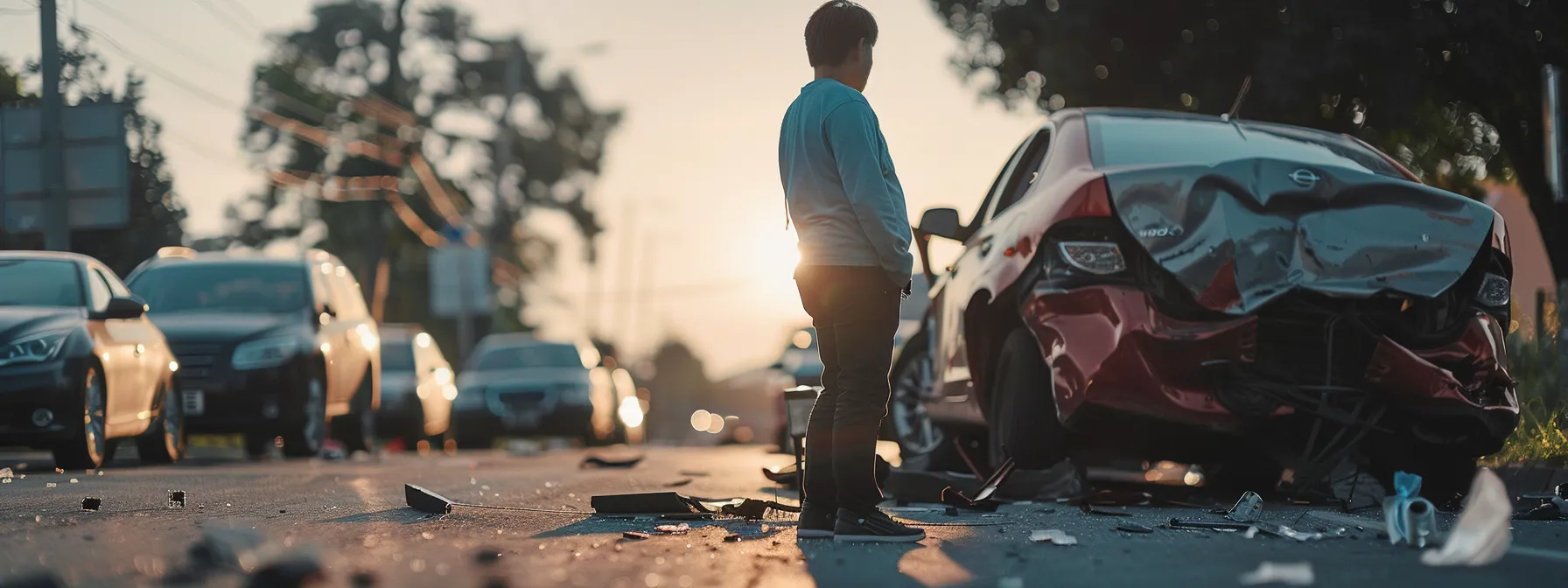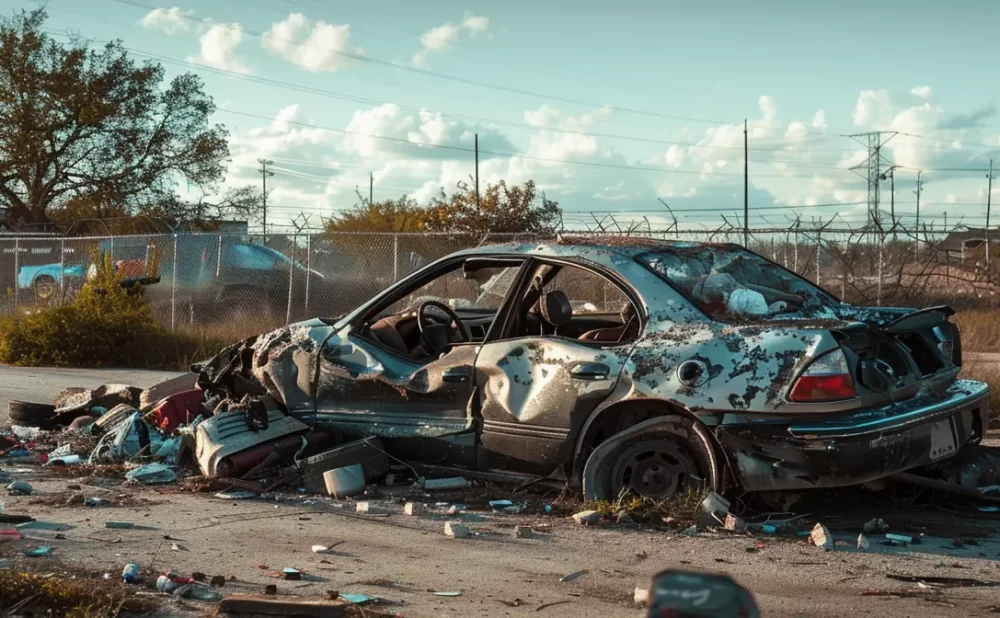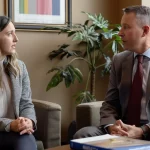In the unsettling aftermath of a car accident in Texas, knowing the right steps to take can be the difference between chaos and a well-handled situation. This article will guide you through crucial actions, from assessing safety to consulting with Heil Law Firm’s seasoned personal injury services. Readers will learn how to effectively document the scene, exchange vital information, and the importance of timely notification to insurance entities. For those feeling overwhelmed, “contact us” is not just a call to action but a beacon of support, ensuring you’re not alone in navigating the complexities of a car accident in Texas.
Key Takeaways
- Documenting injuries and the accident scene is crucial for legal and insurance claims
- Exchanging information with other drivers is required by law and aids claim resolution
- Consulting a legal professional is vital for complex cases and ensuring fair compensation
- Timely reporting to insurance and understanding coverage helps protect one’s interests
- Legal advice is essential when injuries are delayed or in accidents with commercial vehicles
Assess the Immediate Situation Safely

Immediately after a car accident, one’s priority should be to assess the situation with safety at the forefront. Checking for personal injuries is crucial; swift identification of conditions like whiplash or other car accident injuries can be critical for health outcomes. Ensuring passenger safety is equally important, as is moving vehicles out of traffic to prevent further incidents. These steps not only safeguard those involved but also preserve evidence that may be pivotal in cases of distracted driving. The following sections will delve into each of these vital actions in detail. For more information, contact us at heil law firm.
Check for Personal Injuries
Upon the unsettling occurrence of a car accident, it is imperative for individuals to promptly evaluate their physical state for any injuries. The presence of an injury, whether apparent or latent, necessitates immediate attention, as conditions such as concussions or internal trauma may not be immediately evident. This initial assessment is not only a critical step for health but also serves as the foundation for any legal action, particularly if the defendant was driving under the influence. Contact us at Heil law firm for personal injury services.
In the aftermath of a collision, the law requires involved parties to exchange information; however, one should not overlook the necessity of documenting any injuries sustained. Photographic evidence and detailed notes can be invaluable, especially when seeking legal recourse. An experienced personal injury lawyer can offer guidance on preserving such evidence, which becomes instrumental when proving the extent of harm caused by the accident.
Ensure Passenger Safety
After a vehicular collision, ensuring the safety of all passengers is paramount. One must quickly identify any physical injuries, such as spinal cord damage or concussions, which may not be immediately apparent. It is essential to remain calm and methodical, as a proper assessment can influence the outcome of a potential comparative negligence claim in Texas. The safety of each individual can significantly impact both the immediate welfare and the legal process that may follow.
In the event of an accident, it is advisable to contact emergency services if there are any signs of physical injuries among passengers. This action not only provides necessary medical attention but also establishes an official record, which is crucial when navigating through insurance policy claims and legal proceedings. A skilled personal injury lawyer can offer invaluable advice on how to document these incidents effectively, ensuring that the rights and health of all passengers are protected.
Move Vehicles Out of Traffic if Possible
After an accident, if the vehicles are operable and there are no serious injuries, Texas law advises drivers to move their vehicles to the side of the road. This action reduces the risk of additional collisions and alleviates traffic stress. It also allows for a safer environment for the parties to exchange license information and to speak with witnesses. The person at fault should remember that this step does not imply an admission of guilt but is a practical measure to ensure safety and clear the way for emergency services if needed.
Once vehicles are positioned safely, it is essential to document the scene. Photographs of the vehicles’ final resting positions can serve as critical evidence in determining fault during the accident investigation. This visual documentation can be particularly valuable when the accident’s details are disputed or when stress and confusion might cloud a witness’s recollection of the event. A seasoned personal injury attorney can use these images to construct a compelling narrative for their client’s case.
Contact Emergency Services

In the critical moments following a car wreck, contacting emergency services is a decisive step. When to call 911 is a judgment call that must be made swiftly, especially in driving accidents where injuries or hazards are present. Providing accurate accident details to responders is crucial, as it ensures the right resources are dispatched. Moreover, seeking medical attention is imperative, even when injuries from a car crash are not immediately apparent, as some symptoms may manifest later. These actions form the bedrock of a solid car accident case, safeguarding both health and legal interests.
When to Call 911
In the immediate aftermath of a car accident in Texas, determining the necessity to call 911 hinges on several factors. If there are any indications of injury, significant vehicle damage, or a hazard to other motorists, it is imperative to contact emergency services. This not only ensures timely medical assistance but also prompts the arrival of a claims adjuster, who plays a critical role in documenting the scene for car accident claims. A lawyer well-versed in Houston’s statutes can later use the official report to bolster a client’s legal position.
Moreover, when an accident obstructs the flow of traffic or poses a potential threat, calling 911 becomes a legal obligation. The dispatched authorities will secure the area, facilitate the exchange of information between drivers, and generate an accident report, which is a vital document for any subsequent legal proceedings. Engaging a lawyer early in the process can provide guidance on navigating car accident claims and ensure compliance with the statute of limitations, safeguarding one’s right to seek compensation.
Providing Accurate Accident Details
When reporting an auto accident to emergency services, it is imperative to provide precise and comprehensive details. This information is crucial for the insurance company to assess damages and for attorneys to build a strong lawsuit. Accurate descriptions of the car crashes, including the number of vehicles involved, the extent of damage, and any immediate injuries, are essential for a swift and effective response.
Victims should communicate clearly with the responding officer, ensuring that all relevant facts are recorded in the official report. This document becomes a cornerstone in any legal proceedings, as it can significantly influence the outcome of an insurance claim or lawsuit. It is the meticulous attention to detail in these initial reports that often determines the success of a client’s pursuit of justice and fair compensation for damages incurred.
Importance of Medical Attention Even if Injuries Aren’t Obvious
Securing medical attention following a car accident is imperative, even when injuries are not immediately noticeable. Often, individuals involved in road collisions on Texas highways may not experience symptoms until hours or days later, a phenomenon known as delayed onset of pain. This underscores the importance of emergency medical evaluation to uncover any hidden injuries, such as internal bleeding or soft tissue damage, which could have long-term health implications if left untreated.
| Incident Type | Immediate Action | Delayed Symptoms |
|---|---|---|
| Car Accident on Highway | Emergency Medical Evaluation | Possible Internal Injuries |
| Minor Collision on Road | Medical Check-Up | Soft Tissue Damage |
Moreover, the documentation of a medical examination can be a critical element in car accident claims. When injuries manifest after the incident, having a medical record linking them to the car accident can be pivotal in securing fair compensation. It is essential for individuals to understand that a thorough medical assessment serves as a protective measure for both their health and their legal rights in the aftermath of car accidents.
Document the Accident Scene Thoroughly

Following a motor vehicle incident in San Antonio, it is imperative to meticulously document the accident scene. Capturing images of vehicle damage and the surrounding area provides a visual evaluation crucial for insurance and legal processes. Noting road and weather conditions can influence the Texas Department of Transportation’s assessment and a police officer’s report. Additionally, securing witness contact details is vital for corroborating accounts. These steps are essential for a comprehensive record of the event.
Take Photos of Vehicle Damage and Surroundings
In the wake of a car accident, capturing the condition of the vehicles and the accident scene is a critical step. Photographs should include all angles of the vehicles, showcasing the extent of damage, which can be a determining factor in traffic-related personal injury claims. These images serve as tangible proof of the impact and can be pivotal in cases ranging from minor pain and suffering to a wrongful death claim, providing the police and insurance companies with clear evidence of the circumstances surrounding the collision.
It is equally important to document the surroundings where the accident occurred. Photos of traffic signs, road conditions, and any debris can help reconstruct the event and may reveal contributing factors to the accident. This visual evidence is invaluable when establishing fault, particularly in complex cases involving brain injuries or other severe outcomes. A meticulous record of the scene aids legal experts in advocating for their clients, ensuring that justice is pursued effectively in the aftermath of a traffic incident.
Note Road and Weather Conditions
When documenting a Houston car accident, noting the road and weather conditions is essential as they can significantly affect liability insurance claims and the determination of fault. For instance, slick roadways or limited visibility due to fog can contribute to an accident, potentially impacting the outcome of pain and suffering compensations. A law firm specializing in personal injury will emphasize the importance of such details, as they can influence the property damage assessments and the overall legal strategy.
It is the responsibility of those involved in a car accident to provide their law firm with a comprehensive account of the environment during the incident. This includes the state of traffic signals, the presence of potholes, or any other hazards that could have played a role. These factors are critical when insurance companies evaluate claims and when courts assess the extent of damages for pain and suffering:
- State of traffic signals and signs at the time of the accident
- Presence of road hazards such as potholes or construction
- Weather conditions that could have impaired driving abilities
Gather Witness Names and Contact Information
In the event of a car accident in Dallas, securing the names and contact information of witnesses can be as crucial as the legal representation itself. Witnesses offer objective accounts of the incident, proving invaluable in hit-and-run cases or disputes over negligence. An attorney can later leverage these testimonies to strengthen a client’s case, particularly as the statute of limitations in Texas imposes a time frame for filing claims.
| Witness Details | Role in Case | Impact on Statute of Limitations |
|---|---|---|
| Objective Account | Strengthen Claims | Timely Filing |
| Hit and Run Identification | Establish Liability | Critical for Timely Action |
It is essential for individuals involved in a car accident to understand that witness statements can make the difference between a successful claim and one that is dismissed due to lack of evidence. An experienced attorney will emphasize the importance of gathering this information promptly, as memories fade and witnesses may become unreachable, potentially hindering the case as it progresses through the legal system.
Exchange Information With Other Drivers

Following a car accident in Texas, exchanging information with other drivers is a critical step in the resolution process. This section will guide individuals through the essential details to collect, including personal and insurance information, which are pivotal for property damage and injury claims. It will also outline the specifics one should provide to others involved and offer strategies for effective communication at the scene. These practices are fundamental in building a robust car accident case and ensuring a smooth legal journey.
Information to Collect From Others
After a vehicle collision, it is essential to gather comprehensive information from the other driver, which includes their full name, contact details, and insurance information. This data is crucial when law enforcement arrives to file a report and can significantly affect the outcome of a personal injury claim, especially if the incident involved a commercial truck or another large vehicle. The swift collection of this information can alleviate the suffering of those involved by expediting the legal and insurance processes.
One should also request the other driver’s vehicle registration and license number, as these details are necessary for filing an insurance claim. In the context of truck accidents, obtaining the trucking company’s name and the vehicle identification number (VIN) can be particularly important due to the complex nature of commercial vehicle regulations and potential liability issues. These steps are vital in ensuring that all parties have the necessary information to proceed with any legal actions related to the accident:
| Information Type | Details to Collect | Importance |
|---|---|---|
| Personal Information | Full name, contact details | Essential for law enforcement and insurance claims |
| Insurance Information | Policy number, insurance company | Crucial for personal injury claims and coverage assessment |
| Vehicle Information | Registration, license number, VIN (for trucks) | Key for identifying parties and establishing liability |
Details You Should Provide
When engaging with other drivers after a car accident in Texas, it is your responsibility to provide your personal and insurance information promptly. This includes your name, contact details, insurance company, and policy number. Sharing this information is not only a legal requirement but also facilitates the claims process, especially if injuries like back pain emerge, which may require compensation.
Moreover, offering your vehicle registration and driver’s license number to the other parties involved creates a transparent environment and aids in the swift resolution of any disputes. It is particularly important to be forthright if back pain or other injuries are present, as these details will be crucial for medical records and potential legal claims. The exchange of accurate information is the foundation for an equitable settlement and the protection of all parties’ rights.
Tips for Communicating Effectively at the Scene
At the scene of a car accident, clear and calm communication is paramount. Individuals should exchange information succinctly, ensuring that names, insurance details, and contact information are shared without admitting fault or engaging in confrontational dialogue. This approach not only fosters a cooperative atmosphere but also aids in the efficient progression of insurance claims and potential legal proceedings.
It is advisable for those involved to document the exchange of information by using their smartphone to take pictures of insurance cards and driver’s licenses. This method accurately records crucial details and prevents miscommunication, which proves pivotal when filing a claim or seeking legal counsel to navigate the complexities of a car accident case in Texas.
Notify Your Insurance Company Promptly

After a car accident in Texas, it is essential to notify your insurance company without delay. This section will guide you through reporting the accident accurately, understanding your coverage, and interacting with insurance adjusters. One will learn the importance of precise communication, the nuances of their policy, and the critical points to avoid during discussions with adjusters. These insights are vital for protecting one’s interests and ensuring a fair assessment of the incident.
How to Report the Accident Accurately
After a car accident in Texas, it is crucial to report the incident to your insurance company with precision and detail. One should provide a factual account of the event, including the date, time, location, and a description of what occurred, avoiding any speculation or admission of fault. This accurate reporting is essential for the insurance adjuster to evaluate the claim and determine coverage accurately.
It is also important to mention any injuries sustained or damage to the vehicle, as these details will influence the insurance company’s assessment of the claim. The individual should be prepared to supply the insurance policy number and the information collected from other drivers involved in the accident:
| Detail Required | Description | Reason for Importance |
|---|---|---|
| Date and Time of Accident | Exact moment the incident occurred | Helps insurance company establish a timeline |
| Location of Accident | Specific place where the accident took place | Assists in understanding potential environmental factors |
| Description of Incident | Objective account of the events | Crucial for claims adjuster’s investigation |
| Injuries and Damages | Details of any physical harm or property damage | Directly affects the claim’s evaluation and compensation |
| Other Drivers’ Information | Contact and insurance details of all parties involved | Necessary for cross-referencing claims and coverage |
Understanding Your Coverage in Texas
Understanding the specifics of one’s insurance coverage is a critical step after a car accident in Texas. It is essential for policyholders to be aware of their coverage limits, deductibles, and any exclusions that might affect the claim. This knowledge enables individuals to navigate the claims process with confidence and ensures they are adequately prepared for any financial responsibilities that may arise from the accident.
Policyholders should also be familiar with the types of coverage they have, such as liability, collision, or comprehensive. This understanding plays a crucial role in determining how to address damages and what compensation is available for injuries or property damage. For instance, collision coverage may pay for vehicle repairs, while personal injury protection could help with medical expenses:
- Liability coverage – addresses damages to others for which the policyholder is responsible
- Collision coverage – covers repairs to the policyholder’s vehicle after an accident
- Comprehensive coverage – provides protection against non-collision-related incidents
- Personal Injury Protection (PIP) – assists with medical expenses regardless of fault
What to Avoid Saying to Insurance Adjusters
When speaking with insurance adjusters after a car accident in Texas, avoid any statements that could imply fault. For instance, phrases like “I’m sorry” or “I didn’t see you” may unintentionally suggest liability and could be used against you during the claims process. Focus solely on stating the facts, and do not speculate about the cause of the accident or assign blame.
| Statement Type | Potential Impact | Recommended Action |
|---|---|---|
| Admission of Fault | Negative impact on claim outcome | Avoid speculating or accepting blame |
| Speculation About Cause | Could lead to misinterpretation of events | Provide factual information only |
| Discussion of Injuries | Premature statements may affect claims | Speak after a medical evaluation |
Additionally, it is advisable to refrain from discussing the details of any injuries until a full medical evaluation has been conducted. Premature comments on one’s physical condition may not accurately reflect the extent of the injuries, which could complicate the claims process. Policyholders should provide a clear account of the incident and direct adjusters to the official accident report and medical records for the most accurate information.
Consult a Legal Professional Experienced in Texas Accidents

After a car accident in Texas, consulting with a legal professional can be a crucial step. Determining when legal advice is necessary, understanding how an attorney can protect your rights, and preparing for potential legal actions are key considerations for anyone involved in a vehicular incident. The following sections will provide insights into each of these areas, offering guidance on navigating the legal landscape post-accident with the expertise of a seasoned attorney.
Determining When Legal Advice Is Necessary
Seeking legal advice becomes necessary when a car accident in Texas leads to complex liability issues, significant property damage, or personal injuries. An experienced attorney can navigate the intricacies of Texas law, ensuring that one’s rights are protected and that fair compensation is pursued. Especially in cases involving commercial vehicles or uninsured drivers, legal expertise is invaluable in deciphering the nuances of insurance policies and liability.
Moreover, the presence of injuries that may not manifest immediately, such as traumatic brain injuries or soft tissue damage, warrants a consultation with a legal professional. They can advise on the critical steps to take following an accident, from medical documentation to filing a claim within the appropriate time frame. Their guidance is crucial in avoiding common pitfalls that could jeopardize one’s ability to receive just recompense:
| Accident Complexity | Legal Advice Benefit |
|---|---|
| Commercial Vehicle Involvement | Clarifies complex liability and insurance issues |
| Uninsured Driver Collision | Assists in navigating potential compensation avenues |
| Delayed Injury Symptoms | Ensures timely and appropriate medical and legal action |
How an Attorney Can Protect Your Rights
An attorney plays a pivotal role in safeguarding the rights of individuals involved in car accidents in Texas. By meticulously reviewing accident reports, medical records, and insurance policies, legal professionals ensure that their clients are not unfairly blamed or inadequately compensated. Their expertise in Texas law enables them to navigate the complexities of personal injury claims, providing a shield against the tactics insurers may use to minimize payouts.
Furthermore, a seasoned attorney can adeptly manage negotiations with insurance companies, advocating for full compensation that reflects the true extent of damages and injuries sustained. They stand as a bulwark, protecting clients from signing any agreements that could undermine their legal rights or future claims. This legal guidance is crucial for clients to receive the justice and financial support necessary for a full recovery.
Preparing for Potential Legal Actions
Preparing for potential legal actions after a car accident in Texas involves gathering all pertinent documentation, such as the police report, medical records, and any evidence from the scene. This preparation is crucial as it enables a personal injury attorney to build a robust case on behalf of the client. The attorney’s role includes analyzing these documents to establish a clear narrative of the incident, which is essential for pursuing rightful compensation.
It is also vital for individuals to understand the importance of timely action, as Texas law imposes specific deadlines for filing personal injury claims. An experienced attorney will guide clients through this process, ensuring that all necessary legal steps are taken within the statute of limitations. This proactive approach is key to securing a fair resolution and upholding the rights of those affected by car accidents.
Conclusion
In the wake of a car accident in Texas, immediate actions such as assessing injuries, ensuring passenger safety, and documenting the scene are critical for both health and legal outcomes. Accurate communication with emergency services and a thorough exchange of information with other drivers lay the groundwork for a solid insurance claim and potential legal case. Prompt notification of one’s insurance company, coupled with an understanding of coverage, protects against missteps in the claims process. Consulting with a legal professional experienced in Texas accidents is paramount to safeguarding one’s rights and securing just compensation, emphasizing the importance of expert guidance through the complexities of post-accident procedures.







